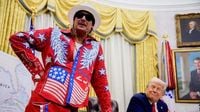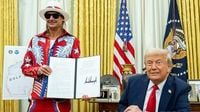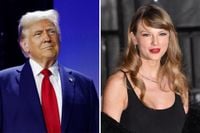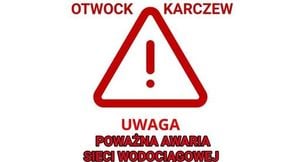On April 1, 2025, President Donald Trump signed an executive order aimed at combating price gouging and unfair practices in the live entertainment industry, a move that has been met with both support and skepticism. Joined by musician Kid Rock in the Oval Office, Trump emphasized the need to protect fans from exorbitant ticket prices, which have become a growing concern in recent years.
Kid Rock, donning a striking red, white, and blue bejeweled suit, remarked, "Anyone who’s bought a concert ticket in the last decade, maybe 20 years—no matter what your politics are—knows that it’s a conundrum." His statement encapsulates the frustration many fans feel regarding the ticket purchasing process, which often includes hidden fees and inflated prices.
The executive order specifically targets ticket scalping and seeks to enforce existing laws, such as the Better Online Ticket Sales (BOTS) Act, which aims to prevent the use of bots to purchase large quantities of tickets for resale at inflated prices. The order instructs the Federal Trade Commission (FTC) to ensure price transparency at all stages of the ticket-purchase process, a critical step for consumers who often find themselves blindsided by unexpected charges.
Trump's order comes on the heels of a significant antitrust lawsuit filed by the Justice Department against Ticketmaster and its parent company, Live Nation Entertainment, in May 2024. The lawsuit alleges that Ticketmaster's monopoly over live events in the U.S. has stifled competition and driven up ticket prices, a sentiment echoed by many artists and fans alike.
The ticketing landscape has seen numerous controversies over the years, notably in 2022 when Taylor Swift's Eras tour ticket sales became a chaotic spectacle. Fans faced hours of waiting and website crashes, leading to the cancellation of the general sale due to overwhelming demand. Prices for tickets eventually soared, with some reaching as high as $22,500 in 2023, prompting widespread outrage among Swifties.
Lady Gaga's fans recently faced similar frustrations when attempting to purchase tickets for her upcoming The Mayhem Ball tour. Reports indicated that lower-level tickets were priced at $1,770, raising concerns about the fairness of ticket pricing. One user on social media lamented, "Just disgusting," while another compared the prices to the infamous Taylor Swift fiasco, stating, "Like be for real . . . £1066 to be front row . . . like what in the Taylor Swift are these prices!?"
In his remarks, Trump highlighted the unfortunate reality that many fans are priced out of attending live events, stating, "It’s very unfortunate." The executive order aims to address these issues by implementing several key measures. For instance, it directs the DOJ and FTC to crack down on the use of bots, ensuring that ticket sellers are held accountable for unfair practices. Additionally, the order mandates that ticket prices be displayed transparently, including all fees, to prevent consumers from being blindsided at checkout.
Live Nation, which controls over 70% of the primary ticketing market for major U.S. concert venues, expressed support for the executive order. In a statement, the company acknowledged that scalpers and bots prevent fans from obtaining tickets at the prices set by artists. They called for meaningful resale reforms, including caps on resale prices and more enforcement of the BOTS Act.
StubHub, another major player in the ticket resale market, also praised the president's efforts. The company stated, "StubHub applauds President Trump for taking steps to better protect fans from ticket bots and bad actors who exploit vulnerabilities in the primary ticket market." However, skepticism remains regarding whether the executive order will lead to meaningful change in the industry.
Critics have pointed out that while the order is a step in the right direction, the real challenges lie in the implementation and enforcement of these regulations. The Future of Music Coalition, a nonprofit organization advocating for fair compensation in the music industry, described the order as sensible but complicated, noting that the FTC is an independent agency and questioning the propriety of a president directing its agenda.
The executive order also addresses the need for compliance with tax laws, directing the Treasury Secretary and Attorney General to ensure that scalpers reselling tickets above face value adhere to IRS regulations. This aspect of the order aims to create additional accountability for companies like Ticketmaster and large resellers, potentially helping to curb exploitative practices.
In light of the ongoing issues within the ticketing industry, the executive order is seen as a necessary intervention to protect consumers and restore fairness to the ticket-buying process. As the implementation details are still awaited, many are left wondering how effective these measures will be in combating the long-standing problems associated with ticket sales.
In conclusion, while Trump's executive order represents a significant move towards protecting concertgoers from unfair pricing practices, its true impact will depend on how rigorously these regulations are enforced and whether they can effectively address the systemic issues that have plagued the live entertainment industry for years.






